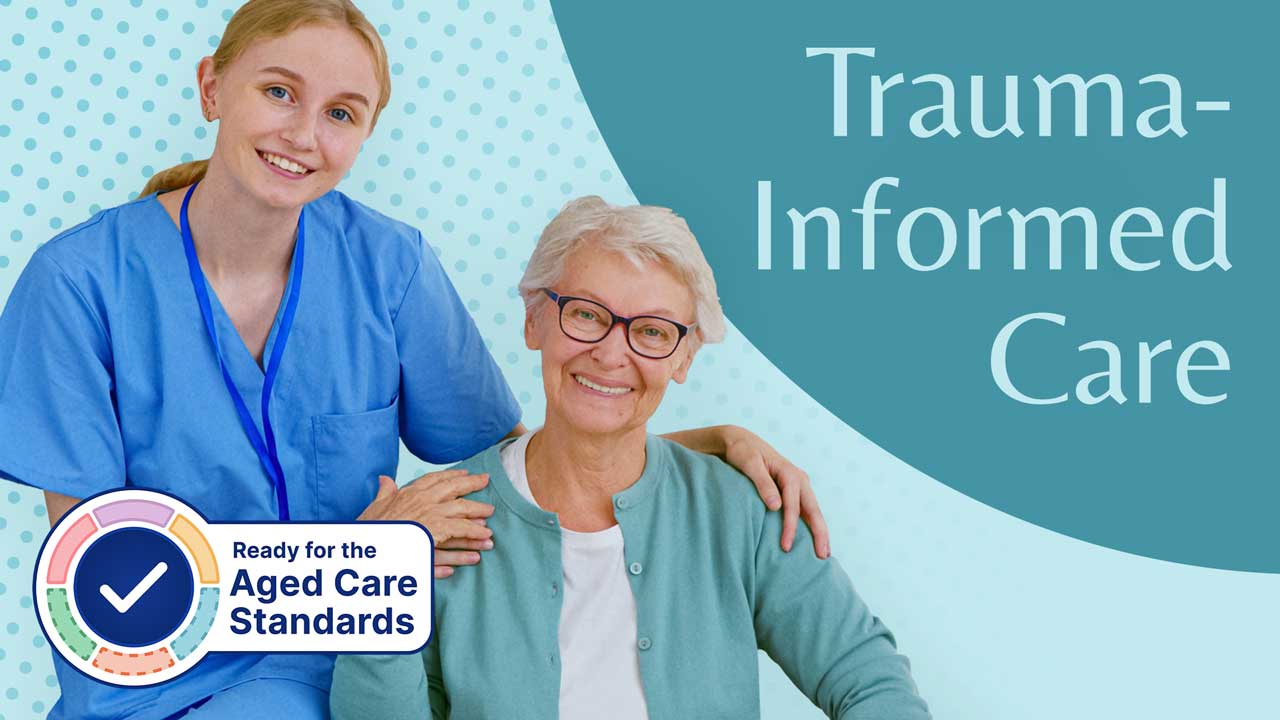Based upon the findings of the Royal Commission into Aged Care Quality and Safety, it was recommended that all workers involved in direct contact with people in the aged care system, as well as those providing care finder and assessment services, be provided with training on trauma-informed care (RCACQS 2021).
So, what does trauma-informed care involve, and how can aged care workers implement the principles of trauma-informed care in their interactions with clients?
What is Trauma?
The term trauma refers to the various psychological and neurobiological effects caused by a particular event or series of events wherein a person felt overwhelming fear, stress, helplessness or horror (RANZCP 2020).
Examples of events that may lead to trauma include, but are not limited to:
- Abuse
- Assault
- Violence
- Accidents
- Illness
- War
- Natural disasters
- Pandemics
- Forced removal of children
- Threats to life
- The unexpected death of a loved one
- Witnessing a critical injury or death
- Difficult childbirth
- Transitioning into residential aged care.
(Phoenix Australia 2021a, b; Wall et al. 2016; AIHW 2022)
In some cases, the effects of trauma are long-lasting. Trauma may affect the way in which people think, feel, and behave. People who have experienced trauma might have difficulty trusting others, feel like they’ve lost control of their lives, or feel isolated or alone (Phoenix Australia 2021a, b).
Trauma may also affect a person’s mental health, leading to anxiety, depression, anger, substance use, or post-traumatic stress disorder (PTSD).
While data on the prevalence of trauma is limited, it’s estimated that 75% of Australian adults have experienced at least one traumatic event during their lifetime (AIHW 2022).
With these statistics in mind, healthcare providers and staff alike need to consider the broad impacts of their care and consider the possibility that the people they are caring for have experienced trauma at some point during their lives (Wall et al. 2016).
Those who are at increased risk of experiencing trauma include:
- People who have experienced homelessness
- Young people in out-of-home care or under youth justice supervision
- Refugees
- People who have experienced family violence
- Members of the LGBTIQ+ community
- Emergency service workers
- Members of the armed forces
- Veterans
- Aboriginal and Torres Strait Islander people.
(AIHW 2022)
What is Trauma-Informed Care?
Trauma-informed care (TIC) is an evolving practice in healthcare that recognises most people have experienced some kind of trauma during their lives and takes this into consideration when providing care (Phoenix Australia 2021a).
TIC involves understanding that trauma may cause lifelong repercussions for a person and impact their emotions and relationships (NSW Health 2022).
TIC avoids re-traumatising people or judging or blaming people for their responses to trauma. Rather than ‘symptoms’, responses to trauma are viewed as adaptive behaviors. TIC encourages empowerment, choice, and engagement on the client’s terms (NSW Health 2022; Health.vic 2015).
By acknowledging that trauma is a possibility in the lives of all the people they are caring for, healthcare professionals will be better positioned to recognise the diverse ways in which trauma presents, appreciate clients’ unique life experiences and reduce the risk of causing re-traumatisation (RANZCP 2020).
Trauma-Informed Care Under the Strengthened Aged Care Quality Standards
Standard 1: The Person - Outcome 1.1 Person-centred care (Action 1.1.2) of the strengthened Aged Care Quality Standards requires aged care workers to provide trauma-aware and healing-informed care to older people using evidence-based practice (ACQSC 2024).
This should include:
- Understanding older people’s life experiences and past and present trauma
- Individualising older people’s care and services to accommodate trauma and past experiences, even if they are not known
- Understanding different types of trauma and their potential impacts
- Being aware that trauma may be present even if it has not been documented in an older person's care and services plan.
(ACQSC 2024)
Recognising Signs of Trauma
Clients who are experiencing trauma might display signs such as:
- Difficulty sleeping
- Not eating
- Headaches
- Gastrointestinal upset
- Disinterest in activities
- Social isolation
- Tearfulness
- Restlessness, anxiety or irritability
- Difficulty concentrating
- Forgetfulness
- Emotional outbursts
- Aggression
- Nightmares
- Strong reactions or refusal to talk about certain topics.
(Phoenix Australia 2022a)
It’s important to remember, however, that trauma presents in a variety of ways - an important part of TIC is acknowledging clients’ diversity and unique experiences.

Providing Trauma-Informed Care
The main principles of providing TIC include:
- Ensuring clients feel physically and emotionally safe
- Establishing trust and being sensitive to clients’ needs
- Providing clients with choice
- Collaborating with the client rather than doing things for them
- Empowering clients
- Respecting diversity.
(NSW Health 2022)
Caring for a Client Who Has Experienced Trauma
- Check the client’s care plan before working with them (especially if this is your first time interacting with them)
- Check-in with the client, and if they seem sad or agitated, ask why they are upset
- Always ask for permission before doing something; explain how you are going to do it and ensure the client understands
- Remember that normal, day-to-day things might remind the client of their trauma, even those that seem innocuous, and be understanding of this
- If the client is upset, ask if they want you to stop what you’re doing or do it in a different way
- If something upsets the client, take note of it in their care plan in order to avoid accidentally reminding them of their trauma in the future
- If the client is distressed, speak calmly, reassure them that they are safe and you are there to help and encourage them to take deep, slow breaths
- Help the client connect with family and friends, including through phone and video calls
- Encourage the client to participate in group outings and activities.
(Phoenix Australia 2022a)
Trauma and Dementia
People living with dementia may find it more difficult to cope with trauma than others. This may be due to the added stress of losing memories, independence, and relationships. In some cases, recent memories may fade and give way to stronger and more upsetting memories of past traumatic experiences (Phoenix Australia 2022b).
Furthermore, dementia can make it difficult for these clients to explain or make sense of their feelings, ask for help, or calm down when experiencing distressing memories (Phoenix Australia 2022b).
In some cases, trauma can present similarly to dementia. If you think a client living with dementia might be experiencing trauma-related distress, it’s important to check the client’s history and/or care plan and escalate your concerns to a manager, general practitioner, or geriatrician so that the client can receive extra support if needed (Phoenix Australia 2022c).
For more information on trauma and dementia, see Phoenix Australia’s resources for aged care workers.
Self-Care for Aged Care Staff

Working with people who have experienced trauma can be distressing, difficult, and stressful, and this might affect your own health.
If you’re having difficulty coping, it’s important to exercise self-care and reach out to others (e.g. family and friends, health practitioners, colleagues) for support.
You can also contact Nurse & Midwife Support for free 24/7 support via their or by phone (1800 667 877).
Signs that indicate you might need support include:
- Fatigue
- Feeling anxious, irritable or negative about work
- Taking sick days to avoid work
- Psychological signs of stress (e.g. loss of appetite, headaches, gastrointestinal upset)
- Difficulty concentrating or remembering things.
Test Your Knowledge
Question 1 of 3
Finish the sentence: The definition of ‘trauma’ is …
Topics
References
- Aged Care Quality and Safety Commission 2024, Standard 1: The Individual, Australian Government, viewed 25 March 2024, https://www.health.gov.au/resources/publications/strengthened-aged-care-quality-standards-august-2025?language=en
- Australian Institute of Health and Welfare 2022, Stress and Trauma, Australian Government, viewed 9 January 2024, https://www.aihw.gov.au/reports/mental-health/stress-and-trauma
- Health.vic 2015, Trauma - Understanding and Treating, Victoria State Government, viewed 9 January 2024, https://www.health.vic.gov.au/practice-and-service-quality/trauma-understanding-and-treating
- NSW Health 2022, What is Trauma-informed Care?, New South Wales Government, viewed 9 January 2024, https://www.health.nsw.gov.au/mentalhealth/psychosocial/principles/Pages/trauma-informed.aspx
- Phoenix Australia 2021b, Aged Care|Trauma, Loss and Grief|Phoenix Australia, online video, 19 August, viewed 9 January 2024, https://www.youtube.com/watch?v=aXBoBpOjfCc
- Phoenix Australia 2021a, Aged Care|What is Trauma-Informed Care?|Phoenix Australia, online video, 19 August, viewed 9 January 2024, https://www.youtube.com/watch?v=gwDrg8xgPAg
- Phoenix Australia 2022c, Trauma and Dementia: What Do I Need to Do?, Phoenix Australia, viewed 9 January 2024, https://phoenixaustralia.org/aged-care/wp-content/uploads/2022/08/Aged-Care-Handout_Trauma_and_Dementia_Staff.pdf
- Phoenix Australia 2022b, Trauma and Dementia: What Do I Need to Know?, Phoenix Australia, viewed 9 January 2024
- Phoenix Australia 2022a, Trauma, Loss and Grief in Older People: What Do I Need to Know?, Phoenix Australia, viewed 9 January 2024, https://phoenixaustralia.org/aged-care/wp-content/uploads/2022/08/Aged-Care-Handout_Understanding_Trauma_Loss_and_Grief_Staff.pdf
- The Royal Australian and New Zealand College of Psychiatrists 2020, Trauma-Informed Practice, RANZCP, viewed 9 January 2024, https://www.ranzcp.org/news-policy/policy-and-advocacy/position-statements/trauma-informed-practice
- Royal Commission into Aged Care Quality and Safety 2021, 1. A Summary of the Final Report, Australian Government, viewed 9 January 2024, https://www.royalcommission.gov.au/system/files/2021-03/final-report-executive-summary.pdf
- Wall, L, Higgins, D & Hunter, C 2016, Trauma-Informed Care in Child/Family Welfare Services, Australian Government, viewed 9 January 2024, https://aifs.gov.au/cfca/sites/default/files/publication-documents/cfca37-trauma-informed-practice.pdf

